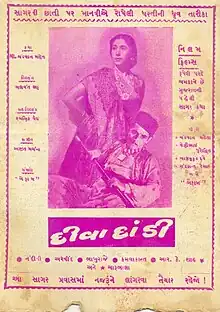| Divadandi | |
|---|---|
 Poster | |
| Directed by | Balwant Bhatt |
| Written by | Ramnik Vaid (script), Chandravadan Mehta (story), Barkat Virani 'Befaam' (dialogues) [1] |
| Starring |
|
| Cinematography | Haren Batt[1] |
| Music by | Ajit Merchant, Dilip Dholakia[1] |
Production company | Neelam Films[1] |
Release date | 1950 |
Running time | 123 minutes[1] |
| Country | India |
| Language | Gujarati[1] |
Divadandi (lit. 'The Lighthouse') is 1950 Indian Gujarati social drama film directed by Balwant Bhatt.
Plot
Sailor Lakhu Malam raises and teaches sailing to his foster-son Kano. Lakhu's son Kavli feels jealous of Kano. When Kano falls in love with Motan, Kavli pushes Kano into opium addiction and kidnaps Motan. Lakhu challenges and kills Kavli. Lakhu is condemned for his crime and was served the penalty of taking care of an old lighthouse.[1]
Cast
The cast is as follows:[1]
- Nandini as Motan
- Arvind Pandya as Kano
- Baburaje as Kavli
- Charubala
- Kamalkant as Lakhu Malam, foster-father of Kano and father of Kavli
- Lohana
- R. K. Shah
Production
The film was shot at Bet Dwarka and features local traditional wooden ships.[1]
Soundtrack
The film is notable for its music composed by Ajit Merchant and Dilip Kumar. It introduced lyricist Venibhai Purohit[1] whose song "Taro Aankhno Afeeni" became hit and still remains popular in Gujarat.[2][3][1][4] Lyrics were written by Chandravadan Mehta, Barkat Virani 'Befaam', Venibhai Purohit, Balmukund Dave[1] and Chandrakant Desai.
| Divadandi | |||||
|---|---|---|---|---|---|
| Soundtrack album by | |||||
| Released | 1950 | ||||
| Genre | Feature film soundtrack | ||||
| Language | Gujarati | ||||
| |||||
All music is composed by Ajit Merchant, Dilip Dholakia
| No. | Title | Lyrics | Singer(s) | Length |
|---|---|---|---|---|
| 1. | "Tari Aankhno Afiini" | Venibhai Purohit | Dilip Dholakia | |
| 2. | "Vagada Vachhe Talavadi" | Balmukund Dave | Dilip Dholakia, Rohini Roy | |
| 3. | "Kajal Kali Raatladi" | Barkat Virani 'Befaam' | Meena Kapoor | |
| 4. | "Pandadi Si Hodi" | Chandravadan Mehta | Meena Kapoor | |
| 5. | "Ek Var Ghogha Jao" | Chandravadan Mehta | Chorus | |
| 6. | "Pumdu Panchhu Nahi Dau" | Venibhai Purohit | Meena Kapoor |
Reception
The film was not very successful but "Taro Aankhno Afeeni" became popular.
References
- 1 2 3 4 5 6 7 8 9 10 11 12 Rajadhyaksha, Ashish; Willemen, Paul (1999). Encyclopedia of Indian Cinema (Revised ed.). Routledge. p. 317. ISBN 978-1-135-94325-7.
- ↑ Smt. Hiralaxmi Navanitbhai Shah Dhanya Gurjari Kendra (2007). Gujarat. Gujarat Vishvakosh Trust. pp. 388, 528.
- ↑ DeshGujarat (2011-01-02). "Veteran Gujarati singer/musician Shri Dilip Dholakia passes away". DeshGujarat. Retrieved 2015-06-09.
- ↑ Tushar, Shukla (13 February 2013). "જ્યારે સાંભળો ત્યારે વેલેન્ટાઈનની અનુભૂતિ કરાવતું એક અમર ગુજરાતી પ્રેમગીત". Gujarat Samachar (in Gujarati). Archived from the original on 24 September 2015. Retrieved 19 June 2015.